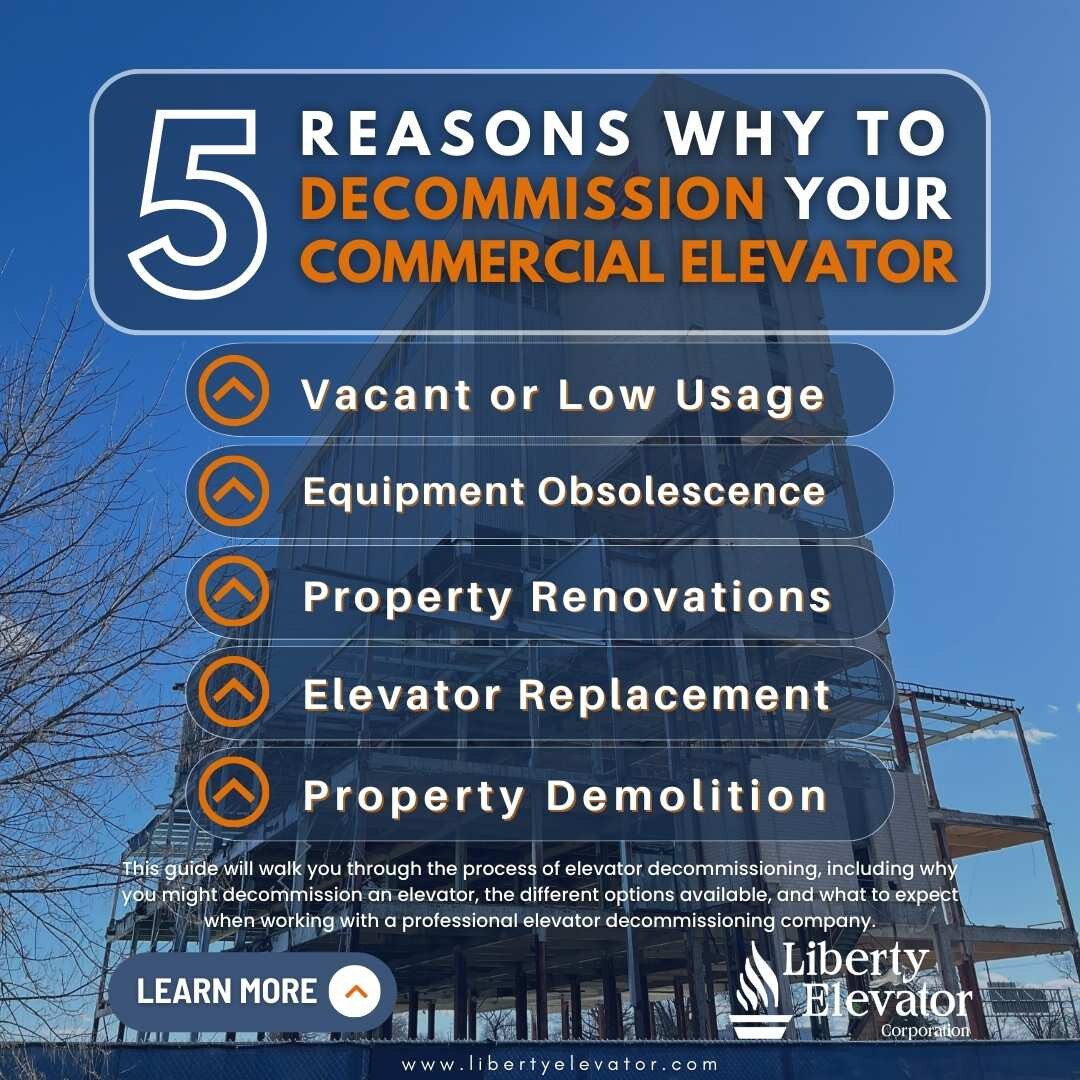Time To Take Your Elevator Out of Service?
Thinking about removing your commercial elevator? You're not alone. There are many reasons a business owner might choose to decommission an elevator. This guide will walk you through the process of elevator decommissioning, including why you might decommission an elevator, the different options available (removal vs dismantling) and what to expect when working with a professional elevator decommissioning company.
Why Decommission an Elevator?
There are several reasons you might decommission a commercial elevator. Perhaps your building tenants don't use it enough to justify the cost of continued service. Maybe the elevator is old and suffers from frequent breakdowns and obsolete hardware. Or, you could be planning a renovation project that necessitates the elevator's removal. Whatever your reason, decommissioning an elevator should be done by a licensed professional who understands the legalities and safety precautions involved.
There are several reasons a business might choose to decommission an elevator. Here are a few common ones:
- Low Usage: An elevator that sees minimal use simply isn't cost-effective to maintain.
- Vacant Property: The property owner of a vacant building is still required to keep the elevators code compliant and operational, unless they have been officially decommissioned.
- Age and Repair Needs: Older elevators might require frequent repairs, have discontinued hardware, or may become more of a financial burden than they are worth.
- Renovations or Replacements: Building renovations might necessitate elevator removal, or you might be planning a complete elevator upgrade.
- Property Demolition: When a building is being torn down it is required by code that all elevators be decommissioned individually prior to property demolition.
Elevator Decommissioning: Removal vs Dismantling
There are two main options when it comes to elevator decommissioning: removal and dismantling. Both options will leave your elevator inoperable, but there are key differences between the two methods.
- Elevator Removal: This is the most permanent option. During elevator removal, all parts of the elevator are extracted from the building. This includes the elevator car, rails, wiring, controllers and even the hydraulic system (if applicable). The only remaining evidence of the elevator will be the empty shaftway and motor room. As you might expect, elevator removal is a more involved and expensive process than dismantling.
- Elevator Dismantling: Dismantling an elevator is a less expensive option than removal. However, it still renders the elevator unusable and meets all legal decommissioning requirements. Dismantling is a good choice if you don't have the budget for a complete removal or if you think you might want to reinstate the elevator in the future. During dismantling, key electrical and mechanical components are removed, but the elevator shaftway and major components remain in place. This allows for the potential future restoration of the elevator, minus the ongoing maintenance costs of an unused elevator.
The Decommissioning Process
When you hire a professional elevator decommissioning company like Liberty Elevator, the first step will be a thorough inspection of your elevator system. Based on this inspection, we will develop a decommissioning plan that adheres to all safety regulations and outlines the timeline for the project.
Once the plan is approved, our skilled elevator technicians will meticulously dismantle or remove the elevator, depending on your chosen course of action. This will include decommissioning the electrical and mechanical systems, safely removing the elevator car and counterweight, and properly disposing of any hazardous materials like hydraulic fluid.
Decommissioning an elevator is a complex job best left to licensed professionals. Here's a general outline of the process:
- Planning and Inspection: A qualified elevator company will first inspect your elevator and develop a customized decommissioning plan that adheres to all safety regulations.
- Dismantling and Removal: Depending on your choice (removal or dismantling), elevator specialists will meticulously dismantle the elevator, removing components like the car, rails, wiring, and hydraulic systems (if applicable).
- Safe Disposal: All removed parts are disposed of following environmental regulations.
Safety First
Safety is paramount throughout the elevator decommissioning process. Liberty Elevator prioritizes the safety of our workers and anyone who occupies the building during decommissioning. We take all necessary precautions to ensure a safe work environment, including proper signage and securing any open spaces that could pose a fall risk.
Benefits of Professional Decommissioning
There are many advantages to working with a professional elevator decommissioning company like Liberty Elevator. We have the experience and expertise to ensure the job is done correctly, safely, and in accordance with all local regulations. We can also help you decide between removal and dismantling based on your budget and the future plans for the space.
Important Considerations
Before deciding between removal and dismantling, consider these factors:
- Permanence: Do you envision ever needing the elevator again?
- Budget: Removal is typically more expensive than dismantling.
- Safety: Choose a licensed and insured company to ensure a safe decommissioning process.
Decommissioning an elevator can free up valuable space and streamline your building's operations. By understanding the process, the removal vs dismantling options, and the key considerations, you can make an informed decision for your business.
Contact Liberty Elevator Today
Is your commercial elevator no longer meeting your needs? Contact Liberty Elevator today! We'll guide you through the decommissioning process and help you choose the most suitable option for your situation. Let our elevator experts handle the decommissioning, so you can focus on running your business.


